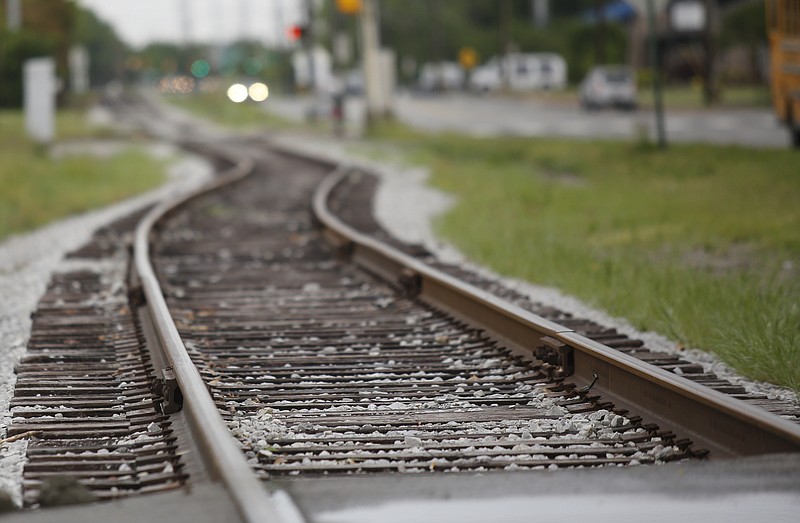Choo Choo city could regain passenger rail service under an $80 billion program proposed by Amtrak rail service as part of President Biden's infrastructure plan.
Chattanooga, which hasn't had rail service since 1970, and Nashville, which lost its Amtrak rail connections in 1979, would gain Amtrak service by 2035 if the U.S. Congress and Tennessee officials adopt the ambitious plans the government rail service outlined this week to expand rail connections to 160 more U.S. cities.
"President Biden's infrastructure plan is what this nation has been waiting for," Amtrak CEO Bill Flynn said in a statement. "Amtrak must rebuild and improve the Northeast Corridor, our National Network and expand our service to more of America."
Flynn said many of the country's biggest and fastest-growing metropolitan areas "don't have the rail service they deserve," including major cities like Houston, Atlanta, and Cincinnati where he said service is inadequate and other cities like Las Vegas, Nashville and Phoenix that don't have service at all.
To restore Amtrak service to Nashville, the rail service is proposing a rail line north of Atlanta through Chattanooga.
But adding more Amtrak service will cost not only Uncle Sam but also the state and local communities that it serves. Amtrak began talking with Tennessee officials last year about a new route from Atlanta to Nashville, but to do so would likely require both state and local participation and funding to develop terminals, rail lines and intermodal connections to serve Amtrak customers.
Many of the new routes are similar to what Amtrak has previously talked about as it sought to garner support from states to sponsor short-distance corridors of less than 750 miles as now required under federal law.
L. Jarod Pearson, president of the Tennessee Association of Railroad Passengers formed in 1979 after Amtrak dropped service to Nashville, said Thursday he welcomes the potential return of rail service to Nashville.
"There is certainly a high traffic volume in this growing region and a need to have a more balanced transportation system which passenger rail service would provide as an alternative to more crowded highways, especially in places like Chattanooga," he said. "I'm glad to see this on the radar of Amtrak and President Biden, but why didn't we do this 30 or 40 years ago when we had the opportunity and it could have been done for less money? The longer you wait to do these projects, the more expensive they get."
Biden's wide-ranging $2 trillion infrastructure package includes $621 billion for transportation infrastructure, with $80 billion of that for passenger and freight rail. Amtrak's plans, as outlined in its "2035 Vision" plan, would add at least 30 new routes with service to 160 cities and multiple daily trips in 15 more states, along with other trip additions.
Already, the $900 billion COVID-19 relief bill adopted by Congress gave Amtrak support to resume service seven days a week on the City of New Orleans passenger train route between Chicago and New Orleans. The route includes stops in Memphis and Dyersburg, Tennessee, which are the only existing cities in Tennessee served by Amtrak.
Republican congressional leaders in Tennessee denounced Biden's overall infrastructure plan unveiled Wednesday as too expensive, far reaching and tax burdensome.
"As the former Tennessee Commissioner of Economic and Community Development, I fully understand the need to invest in projects that will provide a return and grow good-paying jobs, such as our airports, dams, roads, bridges, and broadband," said U.S. Sen. Bill Hagerty, a member of the Senate Appropriations Committee. "However, I will not support a sweeping spending spree full of pet projects for Democrats that are not paid for and that advance the Green New Deal under the guise of infrastructure using the money of hardworking Tennessee taxpayers."
Hagerty and other GOP leaders said the plan will require tax increases on corporations and many individuals and threatens America's energy independence by turning away from abundant fossil fuel resources in the U.S.
"Not even 6% of President Joe Biden's massive $2 trillion 'infrastructure' bill would be used to build roads and bridges," said U.S. Sen. Marsha Blackburn, R-Tenn. "Biden's plan includes the largest tax hike in nearly three decades, but of course, coastal elites will have their taxes slashed. It will strip Americans' of their right to work by forcing them to join Democrat-backed unions."
U.S. Rep. Chuck Fleischmann, an Ooltewah Republican who serves on the House Appropriations Committee, also blasted Biden's infrastructure plan "as a vessel to push far-left priorities and dramatically raise taxes.
"I cannot support this trojan horse 'infrastructure' proposal in its current form," Fleischmann said. "It is my hope that Congress can create a bipartisan package that actually focuses on our critical infrastructure."
Contact Dave Flessner at dflessner@timesfreepress.com or at 423-757-6340.
